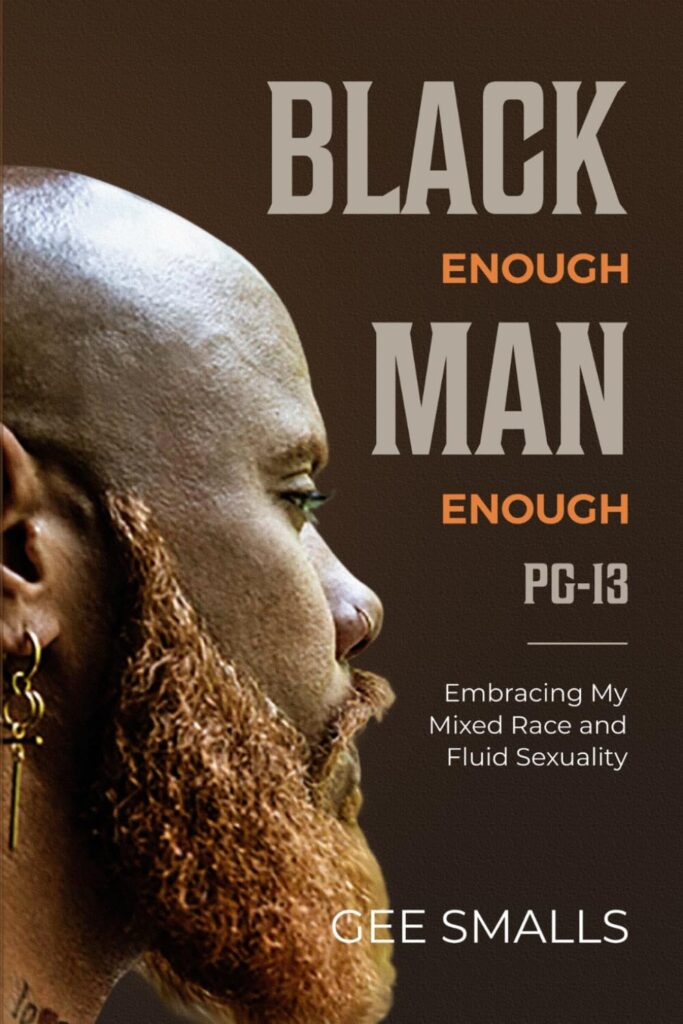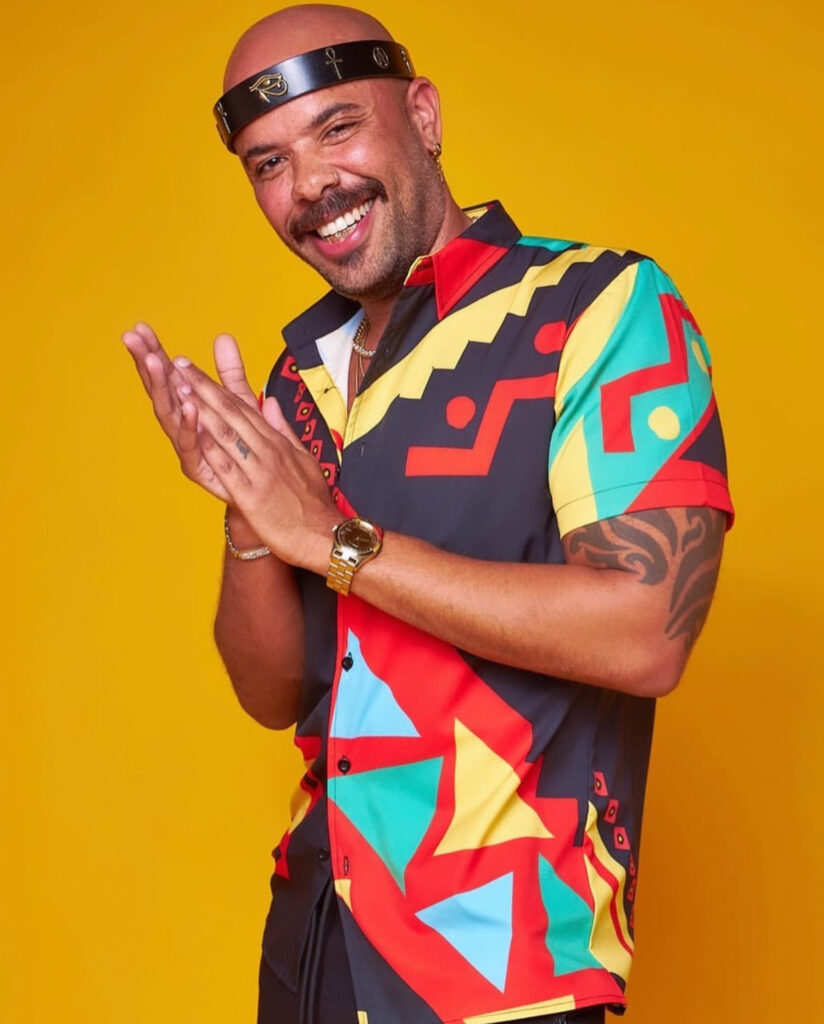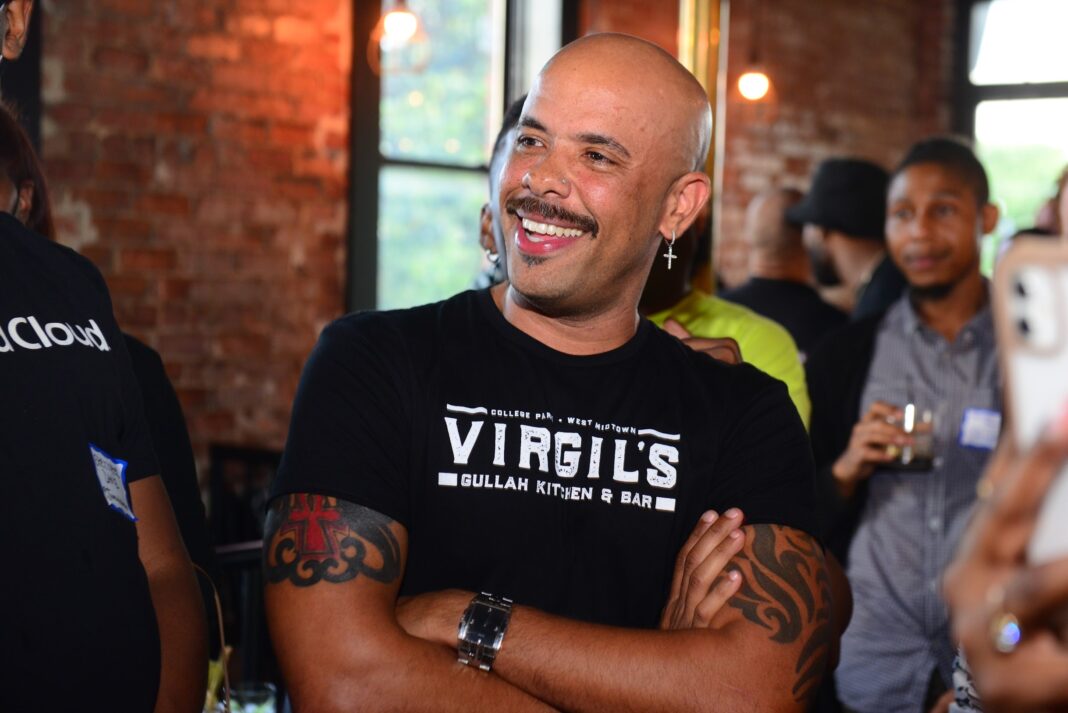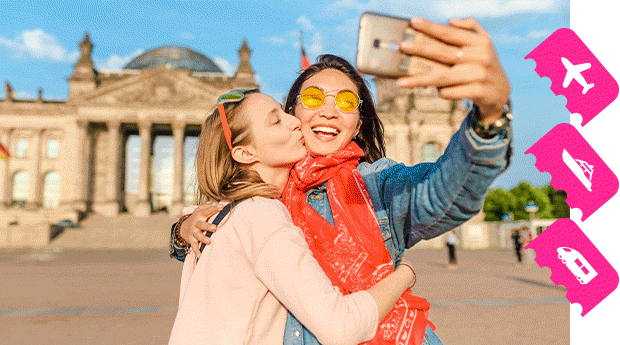Born and raised on James Island, South Carolina, just outside of Charleston, Gee Smalls was an outsider. “I knew I was different, called ‘punk’ or ‘half-breed,’ teased for my light bright skin, soft curly afro, freckly face, and feminine ways,” he writes in his memoir Black Enough, Man Enough: Embracing my Mixed Race & Sexual Identity, which was just re-released in a “PG-13” version this spring.

Born to a Black father and white mother, Smalls struggled to fit in. At 18, he moved to the neighbouring state of Georgia, and in his 30 years of living in Atlanta, he figures he’s lived in 20 different homes. When he was 31, he met his husband, Juan Smalls, who he married in 2009. Together, they now operate four Atlanta-area restaurants, including three locations of Virgil’s Gullah Kitchen & Bar (the closest to downtown is 822 Marietta St. NW, Atlanta) and a brunch place called The Breakfast Boys (3387 Main St., College Park) in the charming suburb of College Park. (The Virgil’s College Park location, the original, is temporarily closed after a fire last fall.)
Virgil’s draws on the tradition of Gullah Geechee cuisine, passed down by some of the earliest Black Americans who relied on seafood, rice and stewed vegetables for many of their recipes. The restaurants serve dishes like okra gumbo, fried oystuhs, Gullah eggrolls and Geechee pasta, with Gee and Juan Smalls appearing on national U.S. media like Good Morning America and The Kelly Clarkson Show.
Yet the couple never intended to go into the restaurant business.
Pink Ticket Travel talked to Smalls about how Virgil’s came to be, what he loves about Atlanta and where he loves to hit the beach.
Your book originally came out in 2000, but you’ve just reissued it in a version that’s aimed at younger readers. Where did the idea for a memoir come from?
I never thought I was going to be an author or write a memoir. It was never my goal or intention. My husband and I were, at the time, both relationship coaches and life coaches. It was our intention to put out a relationship guide, a self-help type of book. We hired a book coach to help us, and one of the homework assignments for us both was to each write a backstory of our lives before we met. I started writing my story and never really put the pencil down—I just kept writing. It turned into this full memoir 360 pages later. My husband, meanwhile, didn’t really feel like writing, so it was me who produced a memoir.
What was it like growing up in South Carolina?
It was unique in a lot of ways. We have such a strong culture there. I come from the oldest Black culture in America, which is called Gullah Geechee culture, so there are a lot of African roots there that I was able to live in and soak in. That was a great part of it. Life was a lot more simple, but it was also very challenging growing up as a mixed-race boy in such a strong Black culture. I also had challenges being sexually fluid in that culture. Charleston is a small city. I wasn’t able to come into myself until I moved to Atlanta almost 30 years ago to attend DeVry University.
South Carolina and Georgia have a lot of similarities, but Atlanta is very different from the rest of Georgia. It’s very progressive. It’s one of the largest Black cities in America. Coming from a predominantly white city, where there’s a lot of white supremacy going, to a predominantly Black city, run by Black people, made a huge difference for me. I saw a lot more opportunity, a lot more exposure, a lot more evolution to life and what it means to be a Black American.
How has Atlanta changed in the 30 years you’ve been there?
When I moved here, the population was just under two million. Now I think we’re over five million. I’ve seen the growth in businesses, residences, gentrification. I’ve probably lived in 20 different neighbourhoods. There used to be a lot of low-income housing in the middle of the city. Now there isn’t much of that, you really have to be on a higher economic level to live in the city. We have a beautiful home in Midtown. We have access to everything—the mileage on my car is low because I never have to drive very far for anything. The diversity of the city is amazing.

Why did you decide to launch your first restaurant in College Park, a half-hour drive from downtown Atlanta?
We didn’t have any intentions of moving to College Park. My husband and I were doing a lot of work in the LGBTQ2S+ community, and there were just no Black-owned spaces in the community that we could go to and feel at home, feel like we were seen for who we are. We would go to these spaces where we may be tolerated, but sometimes not accepted. It was our goal to open up a Black gay bar where we could come in and feel like home. But there was no place in the city that wanted to accept our proposal. We stumbled across College Park, which is outside of the city, and found a landlord who was willing to give us a chance. We took that spot and then found out that we had to serve more food than liquor. We then scrambled to try to figure out what kind of food we were going to serve. We were going to serve pizza. We thought about hot dogs, we thought about hamburgers, tacos. Finally we landed on the food I’ve been cooking all my life, which is of Gullah Geechee culture. It’s soul food. So it evolved into this restaurant where not only did we achieve the goal of opening up a spot owned by men like us, a place to call home, but a place for everybody who enjoys the food, who enjoys the culture. We still have that bar feel. We do trivia nights. We have karaoke nights, we have mixers. We do late-night entertainment stuff. So it’s a good combination of both.
When friends visit, what are some of the essential things you want them to do and see?
Well, I definitely want them to go to my restaurant. There are also a few historical places here in the city that we like to take people to. We’ll go to The King Center (449 Auburn Ave. NE, Atlanta), which is the resting place of Dr. Martin Luther King, Jr., and there are exhibits about his life and work. There’s Centennial Olympic Park (Centennial Olympic Park Dr. NW, Atlanta), where Atlanta hosted the 1996 summer games. We might take them to see sports at Mercedes-Benz Stadium (1 AMB Dr. NW, Atlanta). We also have a couple of favourite restaurants that we like to go to. One of them is Kabob Land (3137 Piedmont Rd. NE, Atlanta), a Mediterranean restaurant that has a very beautiful patio. We also like Roc South Cuisine (3009 Buford Hwy. NE, Atlanta), which is very popular. They serve soul food.
And how about nightlife?
We love to dance. We really like to go to this club called Truth Midtown Restaurant & Lounge (657 Antone St. NW, Atlanta), which is cool. It’s a restaurant with food and cocktails, and the lounge hosts great DJs.
We also go to The Heretic Atlanta (2069 Cheshire Bridge Rd. NE, Atlanta), which is a gay dance club, very social with a nice patio; and the Atlanta Eagle (1492 Piedmont Ave. NE, Atlanta), which is a leather bar but also a dance club with music similar to The Heretic. They bring in DJs from all over—high-tempo beats, circuit beats, house beats.
You and your husband also created a special event called the Gentleman’s Ball, which has become a special night in Atlanta.
When we started doing community work back in 2009, we would go to all of these lavish galas and black tie events that were honouring people in the community who didn’t look like us. We decided to do this second-chance prom, because chances are people in the LGBTQ2S+ community didn’t go to prom with who they probably really wanted to go with. And we wanted to do it in a way where we could honour people in our community who were also pushing for social change, pushing against stereotypes. It started in 2011 as a fundraising gala. We did it for eight years and took a break on it, but we’re bringing it back in 2026. It will be a little different production-wise, but at its core it will be the same, to honour and highlight leaders in our community.
Beyond Atlanta, what’s your favourite place to travel?
I love Brazil and I travel there often. I love Rio de Janeiro and Salvador da Bahia, which has a large population of people originally from Africa, so there’s a lot Black culture there. My favourite beach there is Praia do Forte. I don’t know the bars and clubs in Salvador, but in Rio I love The Home (R. Sacadura Cabral 135, Saúde, Rio de Janeiro). The music is wonderful, as is the energy. It’s a huge club, unlike anything in America. You can get acai bowls and fresh fruit right in the club. (You can read our insider’s guide to Rio de Janeiro here.)
What are some of the differences between you and your husband when you travel together?
Luckily, we’re pretty in sync with how we travel. I will say my husband probably rests a little bit more than I do. Sometimes he may stay at the Airbnb or the hotel while I’m out exploring the town. But for the most part, we have pretty much the same goals. Where are the local people? Where are the local restaurants? Where’s the local nightlife? Sometimes it’s not all about exploring the city but just living in a different place, kind of chilling out.
What’s your packing philosophy?
We always overpack. I usually come home with at least about five or six outfits that I never touched. I’m more of a “throw everything in the suitcase” type of person. My husband folds everything neatly, vacuum packs to keep things really tight and neat. Then, when we get to the destination, he unpacks and puts everything in drawers and organizes everything, while I’m living out of my suitcase and my clothes are all over the place.
This interview has been edited for length and clarity.


